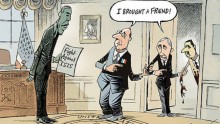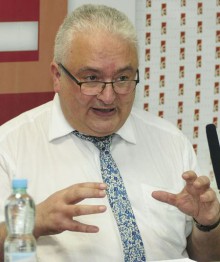The recent speech by President Petro Poroshenko at the Climate Conference in Paris was another challenge for the national media community. And, unfortunately, it should be stated that Ukrainian journalists have failed this “test.” Let us recall that the president’s speech equated the terrorist attacks in Paris with the terrorist war, which Russia launched in the Donbas. This approach seemed inappropriate to several Western journalists. In particular, TV channel France 24’s Kyiv correspondent Gulliver Cragg tweeted that Poroshenko’s words looked like an attempt to use Paris as a platform to talk about the Donbas. According to the journalist, this approach will only hurt Ukraine. Obviously, his stance is debatable, but the subsequent developments were even more interesting.
The national media started to spread the news about the alleged negative reaction of the French media to Poroshenko’s speech. In response, social networks exploded with indignation over the Europeans’ purported inability to sympathize with our grief. People said that lives of thousands of Donbas Ukrainians were apparently worth much less than lives of 130 victims of terrorist attacks in Paris. It is not that hard to guess who benefits from such a “constructive” discussion. And the truth is, we did not have to search long. The news of the French media’s purported outrage at the president’s speech first appeared on Russian resources, including websites of Zvezda TV channel, Russkaya Vesna, and Novorossiya. Meanwhile, Ukrainian journalists just thoughtlessly spread it. It was exactly like in February 2014, when they spread reports of “people’s militia” being created in Crimea...
In fact, no negative reaction to Poroshenko’s speech appeared in the French media. It was only expressed on social networks, as a private thought of several journalists who deal with Ukrainian issues. Incidentally, there is no reason to suspect them of “working for the Kremlin” either, so this time, the Russian Internet trolls have done their job by proxy.
This situation has also shown how vulnerable to victim thinking Ukrainians are, since it looks like the vast majority are psychologically well prepared for the idea that “Europe will exchange us for Syria.” We will discuss whether such fears have some rational basis, and what the reaction of French society and the media to Poroshenko’s speech really was with French philosopher, professor at the University of Paris II, Philippe de LARA.
“We should always be wary of Russian media. Nothing of the kind happened in France during President Poroshenko’s visit. I made a quick inquiry [about unfavorable comments on the speech of Ukrainian President Poroshenko at Paris Climate Change Conference. – Ed.] and I could not find any. The real problem with Poroshenko’s visit is not the unfavorable comments but the lack of comments. Of course, he was challenged by a lot of leaders, notably Barack Obama, whose visit was highly significant and, as always impressive because of the huge security and the symbolic moments, like the dinner with President Hollande in a famous restaurant. But the problem remains – Ukraine has almost disappeared from the media’s radar since the war in Syria and of course Black Friday. It was predictable, but it is nevertheless dangerous for Europe and Ukraine. Yet, things could be worse: French media have forgotten Ukraine, but France did not become suddenly naively friendly with Russia. French government has not forgotten the aggressions in Crimea and Donbas, and the threats Putin poses on Europe. They were therefore prepared to have a watchful and without illusion attitude towards Russia’s involvement in Syria. Hollande’s words were very clear: we expect from Russia ‘a better military cooperation,’ which is less than cooperation as such, let alone political cooperation. French opinion is well aware of Putin’s dangerous and personal game in Syria. People knows that this war is multifaceted, with intricate stakes and actors, that we have one definite enemy, ISIS, but a lot unreliable partners, not many true allies, and Russia is not one of them.
“French have been truly impressed by the beautiful gestures of solidarity coming from Ukraine, but they are not ready to understand the Russian aggression and subsequent events as terrorism. It is unfair and inaccurate, but it is so. Hybrid war is unfortunately rather efficient, and especially the information war. It did not succeeded in having France taking side against Ukraine for Russia, but Ukraine remains much ignored. Putin is more and more unpopular because he is seen as a dictator. I think the main job for Ukrainians and their friends is not as much to promote the cause of Ukrainian freedom, but to convince that it is a struggle ‘for our freedom and yours.’ I feel that a lot of people here are rather sympathetic to Ukraine, but they see it as a remote country, whose problems are strictly local. Hybrid war is so to speak like a tsunami in Asia or South America: it is very sad, but not really of our business! This what we must change, stress again and again that it is the future of Europe which is at stake, that the poor ‘Malorossians’ are in fact the future of political freedom and independence in Europe.”
Why is the French government trying to bring Russia into anti-ISIS coalition, in spite of all? After all, that country is a sponsor of terrorism and continues aggression against Ukraine; moreover, it has violated all international norms by annexing Crimea. Do the French fail to notice that Russia’s actions to protect the Assad regime have only worsened the situation in Syria and increased the refugee flow?
“France is well aware that Putin is not a reliable partner in the anti-ISIS coalition. At least the current government is. Minister Fabius suggested that Putin was a ‘dictator’ no less than Assad. What France is trying to do is to improve technical relationships with Russian forces on the ground and to create a framework that will press Russia into a more cooperative game in the Middle East, and in Europe. We are well aware of the ambiguity, to say the least, of Russia in front of the refuges crisis, and other issues like oil prices. But we must take into account the big game of the world chaos, where every issue is interrelated. Putin is irrational, but Russia has interests and therefore might be rational. This how the Western leaders are thinking now. The limit between taking into account the interests of Russia, and deceiving oneself on its rationality and willingness to be partner in the world order is thin, but it would be self-defeating to renounce to influence Russia on the ground that its current leader is a KGB maniac. This put, Russian propaganda and Russian networks among political and economical elites are very aggressive in every European country. The worst Kremlin intoxicated politicians (Sarkozy, Le Pen, in France, Schroeder, Sigmar Gabriel in Germany) are not in power now, but they could be tomorrow.
“To sum up: the attacks and the situation in Syria have led French opinion and French leaders to a more lucid vision of the power relations and to some distrust with Russia, but there is still a long way to go to acknowledge fully the shady relations of Russia with terrorism and its belligerent attitude towards Western democracies. Ukraine should act as a big actor and not as a small victim in this context. President Poroshenko’s interventions in Paris on Holodomor, ecological disaster in Donbas, and Ukraine’s experience of terrorism where perfectly appropriate, it is a pity they had no greater impact until now.”
COMMENTARY
“MILITARY COOPERATION WITH RUSSIA WILL BE PROBABLY INEFFECTIVE”
Alain GUILLEMOLES, French journalist and writer, author of the books Even the Snow Was Orange. The Ukrainian Revolution and Gazprom: The New Empire:
“I didn’t see any reaction in French media about Poroshenko speech. In fact, this speech was unnoticed because it was one among 160 speeches, and media only pays attention to the one of Chinese or US president, no more. For sure, French lack understanding of Ukrainian problems in spite of our work of explanation. But we do not compare Islamist terrorism and Russian aggression. In first case we face an attack from non-state actor. And you face aggression of local military helped by neighbor state. It is very different. About Syria, we look for military cooperation with Russia. But a strategic global partnership is not on the agenda. This is only a consequence from the fact that Obama refused to bomb Syria in 2013. As USA is passive in the region, French are looking for others partners. Even if I don’t like this I must recognize that we have not so much others choices. But I think this strategy will be probably ineffective.”









